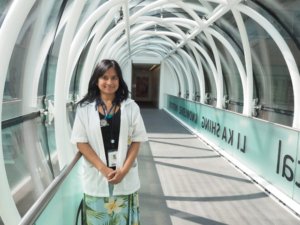 For more than a decade, Dr. Sharmistha Mishra has been helping those with HIV – and the services, programs and policies that impact them the most.
For more than a decade, Dr. Sharmistha Mishra has been helping those with HIV – and the services, programs and policies that impact them the most.
And, she’s done it all using mathematical modeling.
“Mathematical modeling allows us to tease apart mechanisms that might interact and influence how infections might circulate in a population, and how things at various levels could drive transmission or help prevent transmission,” explains Dr. Mishra, who recently received the CAHR-CANFAR Excellence in Research Award in the Epidemiology/Public Health Research Stream.
As a clinician and scientist at St. Michael’s Hospital, Dr. Mishra and her lab use mathematical models to try and understand HIV and STI epidemics – which cannot be addressed through clinical trials and cohort studies alone.
Dr. Mishra uses mathematical modeling to try and understand why HIV epidemics are established and persist, where and when they persist, and what leads to differences in their size and characteristics across different regions. Her lab also uses this modeling to understand the best combinations of HIV and/or STI prevention tools, which help control epidemics.
“These models can often uncover something unexpected by simulating patterns of individual behaviour, of biology, and of social and sexual networks, especially how people might adapt within a network,” she says. “The downstream benefits, or consequences, can often be tested before we try out interventions, or used to evaluate the impact of interventions.”
Dr. Mishra works collaboratively with clinicians and public health units both nationally and internationally – including in India, Kenya, South Africa and Ukraine.
She says she was inspired to work in the HIV Research field while doing her clinical elective abroad. While in Karnataka, India, she worked with the Avahan HIV prevention program – a program co-designed, co-delivered, and led by community-based organizations serving women and men engaged in sex work in partnership with the state government ministry of health and University of Manitoba.
“My initial goal was to learn more about HIV and syphilis from a clinical-perspective, but in the context of gaining clinical knowledge within a large public health program, I found myself curious about the population-perspective,” Dr. Mishra remembers. “I knew a few months into that elective that I wanted to understand the tangled pathways and consequences of heterogeneity in risks of HIV and STIs at the population-level.”
Throughout her career, Dr. Mishra says she has had many rewarding moments – including when her lab uncovers or grasps something that was not evident.
“My most intellectually rewarding moments are when I realize my thinking was way off base and I need to go back to the drawing board – that is often when I learn something about the ‘modeled system’ that I didn’t realize before,” she says.
But she adds that it’s also rewarding to see her lab’s work get put into action.
“At the heart of our work, the most rewarding moments are when we have the opportunity to work with communities and decision-makers to generate robust, transparent, model-based evidence that could be used to help shift a narrative around our understanding of HIV/STI epidemics,” she says. “It’s rewarding to help front-line programs and services with their design or evaluation, or better inform policy-changes.”
Dr. Mishra felt honoured to be awarded the CAHR-CANFAR Excellence in Research Award, and adds that she has many mentors to thank for her success – including Sharon Walmsley, Rupert Kaul, and Marie-Claude Boily. She adds that she feels lucky to have peer mentors, like Marissa Becker and Stefan Baral, who continue to inspire and encourage her in her work.
But she says the most important mentor in her life was her grandmother.
“Her keen insights about perspective, history, and the importance of storytelling have served me well in academia!” she says.
